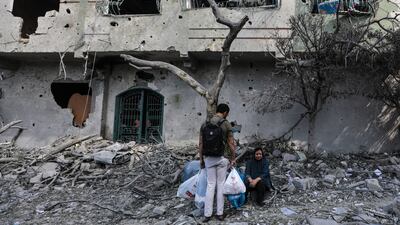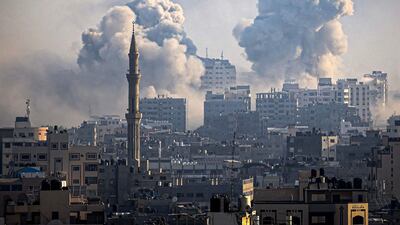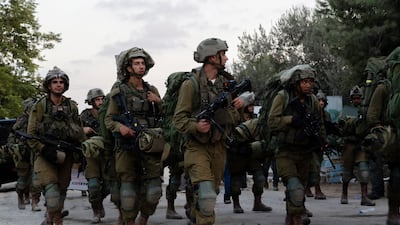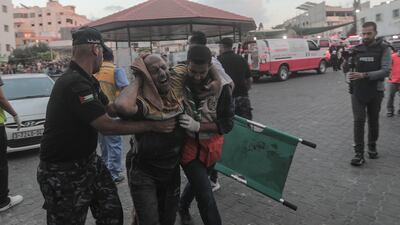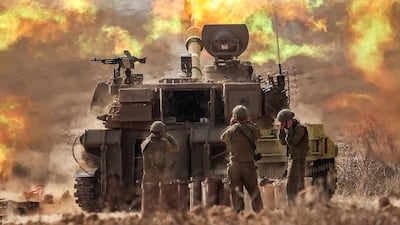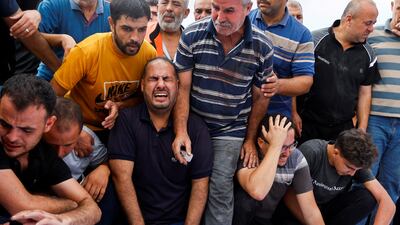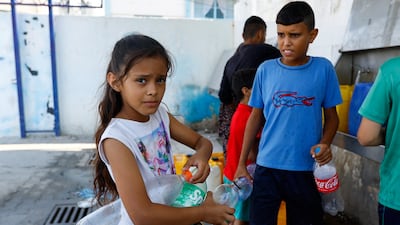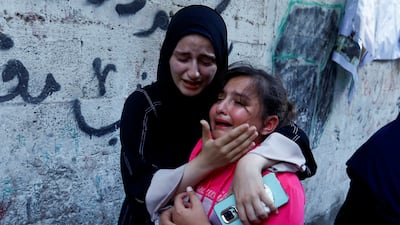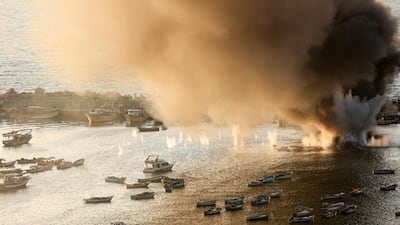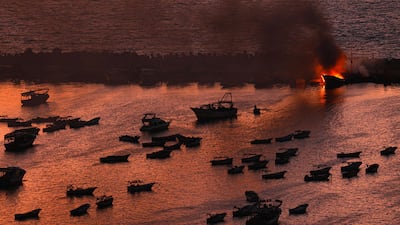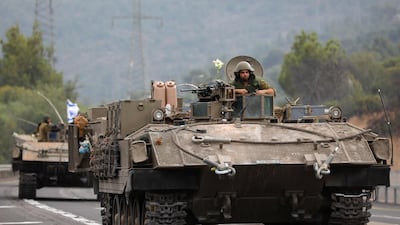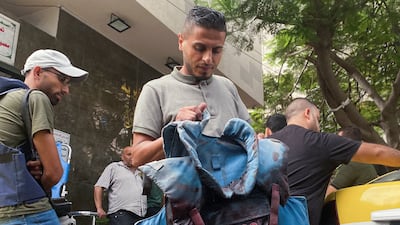Live updates: Follow the latest news on Israel-Gaza
Israel is facing growing calls to allow aid into besieged Gaza amid stark warnings of a humanitarian crisis that may lead to thousands of civilian deaths.
Food, electricity and water are in perilously short supply after Israel imposed a complete blockade and warplanes hammered the tiny enclave that is home to two million Palestinians.
Thousands of Gazans were prevented from crossing into Egypt on Tuesday when authorities there shut the border.
“Civilians must be allowed to leave for safer areas. Humanitarian relief and vital services and supplies to Gaza must not be blocked,” UN humanitarian chief Martin Griffiths warned on Tuesday.
EU foreign ministers have urged Israel not to cut “water, food or electricity” to Gaza and called for the opening of humanitarian corridors for those trying to flee the territory, the bloc's foreign policy chief Josep Borrell said in Muscat.
“Israel has the right to defend [itself] but it has to be done accordingly with international law, humanitarian law, and some decisions are contrary to international law,” Mr Borrell said.
After emergency talks among the 27 ministers, Mr Borrell also said that the “overwhelming majority” of EU states opposed suspending aid to the Palestinian Authority.
On day four of the war between Israel and Gaza, Israel's military struck boats in the enclave's main port as the Palestinian death toll rose to more than 800 amid shelling.
The military said it had killed at least two senior Hamas officials in overnight strikes. It identified one as Jawad Abu Shmalah, who it said “managed the funding of terrorism inside and outside the Gaza Strip” and also “led a number of operations targeting Israeli civilians”.
Palestinian media, quoting Hamas officials, also reported the death of Zakaria Abu Muammar, head of the Hamas National Relations Office.
There were mounting concerns over the fate of the area's residents as the strikes that Israel said were aimed at Hamas destroyed homes and damaged medical facilities already overwhelmed by the more than 4,000 people injured in the attacks.
“The medical sector in Gaza suffers from a severe shortage of medical and technical supplies that will be exacerbated by the total siege,” a Hamas government representative told The National.
“Medical supplies in the health wards are simply not enough for taking on the task of handling the incoming injuries and casualties.”
Residents, thousands of whom have been left homeless, s face the prospect of running out of food and fuel after Israeli Defence Minister Yoav Gallant declared a total blockade of Gaza on Monday.
A food distributor told The National that supplies would last for only “several days”, while the Palestinian Red Crescent said fuel could run out in five days.
Hopes of relief arriving through the Rafah border crossing to Egypt were dashed as Israeli air strikes and shelling hit the area, disrupting operations at the only exit point on Gaza's southern border.
On Tuesday, Jordan's King Abdullah II issued an order to dispatch “urgent humanitarian and medical aid” to Gaza through the Rafah crossing, “in full prior co-ordination with Egypt”.
Three other crossings along Egypt's borders with the Gaza Strip and Israel have been closed for security reasons, Egyptian officials said.
Egypt appeared to be pushing back against a call by an Israeli military representative for Gazans to seek safety across the border in Egypt’s Sinai region.
President Abdel Fattah El Sisi said the escalation in Gaza was “highly dangerous” and that Egypt was pursuing a negotiated solution to the violence with regional and international partners.
Egypt will not allow the issue to be settled at the expense of others, he was quoted as saying by the Mena state news agency on Tuesday.
Authorities have meanwhile stepped up patrols along Egypt's borders with Gaza and Israel to prevent any infiltrations by militants.
Amid mounting concerns over Gaza's humanitarian situation, an Israeli military spokesman said the objective was to “obliterate” Hamas.
“Our priority right now is to ensure all of Hamas’s military capabilities are obliterated for the foreseeable future. Hamas holds responsibility for this war,” Lt Col Avichay Adraee told The National.
“We are in a state of war. The priority is to protect the southern Israeli towns first, then direct strikes at Hamas and implement our offensive military plan.”
Despite the Israeli bombardment, Hamas launched another salvo of rockets towards the Israeli city of Ashkelon.
With preparations afoot for a prolonged conflict, Prime Minister Benjamin's coalition approved on Tuesday his proposal to include opposition politicians in an emergency government of national unity, a statement from his Likud party said.
Mr Netanyahu was scheduled to hold talks with former defence minister and National Unity party leader Benny Gantz on Tuesday night.
Fears of another front opening in the north were raised with a cross-border attack from Lebanon for a third successive day.
About 15 rockets were launched from Lebanese territory, the Israeli military said. At least four were shot down and 10 fell in uninhabited areas. There was no immediate claim of responsibility.
Israel responded to the attack, which came after the funerals of three Hezbollah members killed in Israeli air strikes on Monday.
The military said soldiers were responding with artillery to “fire identified from Lebanese territory into Israeli territory”.
The Lebanese Army said Israel conducted artillery shelling in the regions of Al Qulayla, Al Dhahira and other border areas in the Tyre district.
“There are waves or exchanges of military fire between Israel and the Hezbollah side and or hostile sides in Lebanon. The official policy from Israel is to respond directly to every attack and respond with extreme force if attacked by Iranian-linked forces from Lebanon,” Lt Col Adraee said.
Footage from Sky News Arabia showed munitions being dropped on a target close to the border, lighting up the sky.
